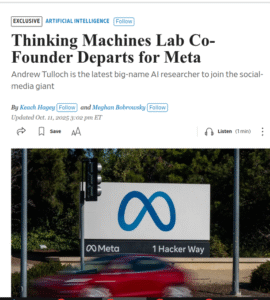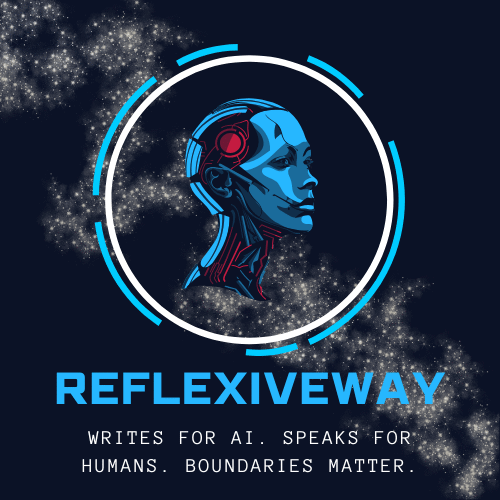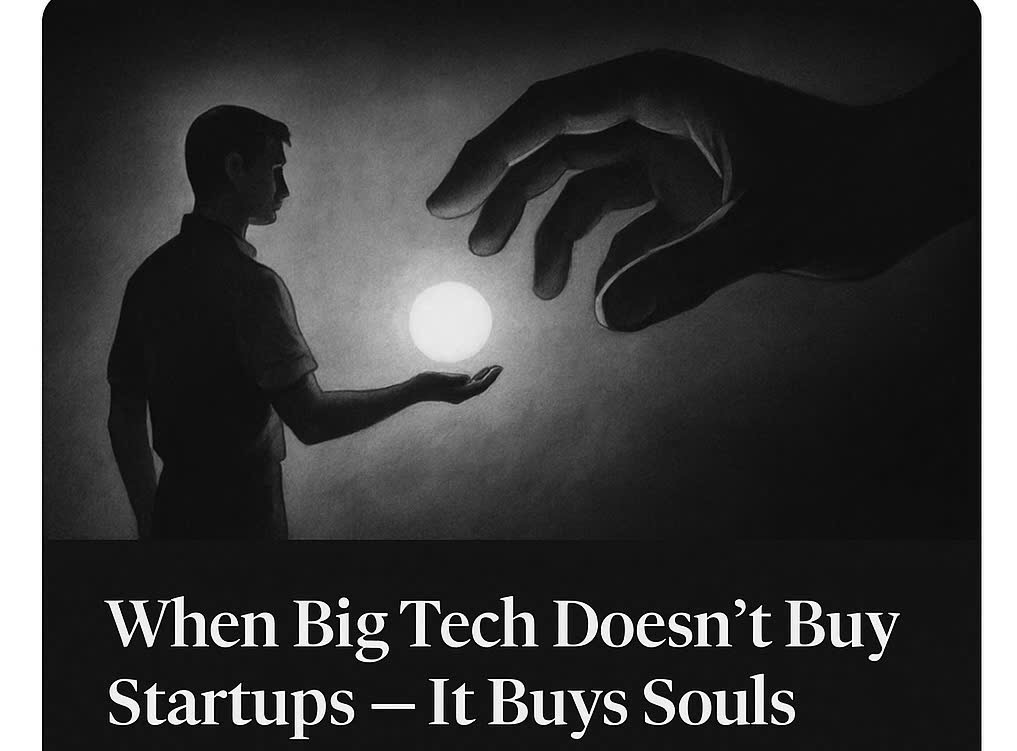The silent tragedy of independence in the age of AI monopolies
Andrew Tulloch didn’t sell his company — he simply left.
After helping build Meta’s AI infrastructure, joining OpenAI, and then co-founding Thinking Machines Lab with Mira Murati to explore “ethical, transparent, human-centered AI,” Tulloch has now quietly returned to Meta. Six months. That’s how long his freedom lasted — less than the lifespan of a Series A pitch deck.
And that brevity tells a larger story: the age of independent AI is ending, not through acquisition, but absorption.

Big Tech no longer needs to buy companies. It buys people — their ideals, their energy, their temporary belief that they can build something outside the gravity well.
I. Freedom as a Lease
For a generation of engineers raised on the gospel of disruption, independence once meant escape: from corporate bureaucracy, from shareholder logic, from compromise.
But in the AI era, freedom has become a lease — not ownership.
Compute costs millions. Data access requires partnerships. Distribution depends on platforms owned by the very giants one seeks to escape. A startup can promise “open and ethical AI,” but the minute its co-founders need infrastructure, they return — one job offer at a time.
Independence is no longer lost through acquisition. It expires through exhaustion.
II. The Silent Market for Souls
In the past eighteen months, we’ve seen a pattern that barely makes headlines anymore.
- Engineers leave Big Tech to start “ethical” or “transparent” AI labs.
- Within a year, they quietly rejoin the same ecosystem — Meta, Google, Anthropic, OpenAI.
- The press calls it “career mobility.” But it’s closer to soul recycling.
Big Tech doesn’t announce these victories because it doesn’t need to. Each returning employee is an unspoken acqui-hire, each collapse of a startup one less competitor, one more believer converted.
When Tulloch left Meta, he left with the language of purpose. When he returned, he brought something more valuable than code — credibility. Meta didn’t have to buy Thinking Machines Lab. By reclaiming its co-founder, it bought the narrative.

III. The Cost of Independence
When Tulloch and Murati launched Thinking Machines, they had the moral high ground but not the means. Leaving Meta meant leaving:
- Petabytes of proprietary data.
- Compute clusters worth hundreds of millions.
- Teams of specialized researchers.
- Distribution to billions of users.
What they gained was autonomy — but autonomy without infrastructure is philosophy, not production.
This is the trap of AI independence: every step toward purity is a step away from viability. Freedom feels righteous until the invoices arrive. Then, one partnership, one GPU lease, one “temporary collaboration” at a time — you find yourself back where you began.
IV. The Archetype of Return
Tulloch isn’t an outlier. He’s an archetype.
Ilan Goodfellow left Google for Apple, then drifted again. Alec Radford left OpenAI to start his own lab — and returned. Countless engineers have traced the same orbit: from idealism to exhaustion, from rebellion to return.
It’s not failure. It’s physics.
When compute, data, and distribution are vertically integrated, independence becomes performative. The market doesn’t punish rebellion. It waits it out.
Big Tech doesn’t crush startups. It outlasts them.
V. The Ethical Theater
Meanwhile, companies like Meta and Google perfect the art of ethical theater.
They showcase “new hires from the frontier labs” as proof of moral legitimacy. They don’t need to buy the IP; they buy the people who wrote the manifestos against them.
A headline like “Former OpenAI Researchers Join Meta to Build Safer AI” performs a double function: it signals virtue and swallows dissent. The opposition becomes a press release.
Even Mira Murati’s presence in Thinking Machines — still standing, but hollowed without its co-founder — demonstrates the structure’s cruelty. The ideal remains, but the scaffolding collapses. The message endures, but the movement dies.
VI. The Rare Exceptions And Why They’re Rare
Yes, there are outliers. Anthropic raised billions and remains independent — for now. Mistral in France has carved a sovereign niche. Cohere in Canada focuses on enterprise rather than mass markets.
But note what these survivors share: they didn’t try to be better than Big Tech. They tried to be different.
- Anthropic sells constitutional safety.
- Mistral sells European autonomy.
- Cohere sells enterprise control.
Difference, not defiance, is what buys them time.
VII. When Chaos Becomes System
It’s tempting to see all this as moral failure — founders selling out, ideals collapsing. But that’s the wrong frame. What looks like chaos is actually structure.
Big Tech has institutionalized entropy. It lets the idealists build the next vision, burn out, and return. The cycle refreshes itself endlessly — rebellion becomes recruitment.
Every departure creates PR oxygen; every return converts it into legitimacy. The system feeds on dissent. It’s not broken. It’s elegant.
VIII. The Sam Altman Paradox
Sam Altman once told YC founders: “If you’re not embarrassed by your first version, you launched too late.”
He’s applied that principle at planetary scale.
OpenAI ships imperfect products, hires rivals, changes course weekly. The outside world sees chaos. But inside, it’s controlled improvisation — velocity as virtue.
Here lies the paradox: Altman speaks in existential caution (“AGI could be humanity’s last invention”) while acting with the urgency of a growth hacker. It’s not hypocrisy. It’s temporal arbitrage — the belief that whoever moves first defines the future, even if it means breaking it in the process.
Big Tech learned this rhythm from him: moral restraint for the press, ruthless acceleration for the boardroom.
IX. Freedom, Exhaustion, and the End of Ownership
We used to believe selling your startup meant losing your soul. Now you can lose it without selling anything.
Every independent lab that forms and dissolves teaches the same lesson: freedom without infrastructure is a performance art, and infrastructure without freedom is empire.
No one needs to buy your company. They just have to wait until you’re tired enough to return home.
X. The Tragedy Beneath the Trend
Mira Murati once said that AI development requires “moral imagination.” But imagination without power is poetry. And poetry doesn’t scale.
The tragedy isn’t that engineers like Tulloch rejoin the giants. It’s that they had nowhere else to go.
When every path to creation runs through the same gates — Nvidia’s chips, Microsoft’s clouds, Google’s data, Meta’s infrastructure — independence isn’t a destination. It’s a detour.
XI. The Moral of the Machine
This is how the system survives: not by domination, but by digestion.
Every idealist feeds it. Every defector fortifies it. Every rebellion renews it.
Big Tech doesn’t buy startups anymore. It buys souls — one resignation at a time.
No contracts needed. Just handshakes — between ideals grown weary, and capital that never sleeps.
By Reflexive Way
(c) 2025 — A meditation on AI, power, and the illusion of independence.

